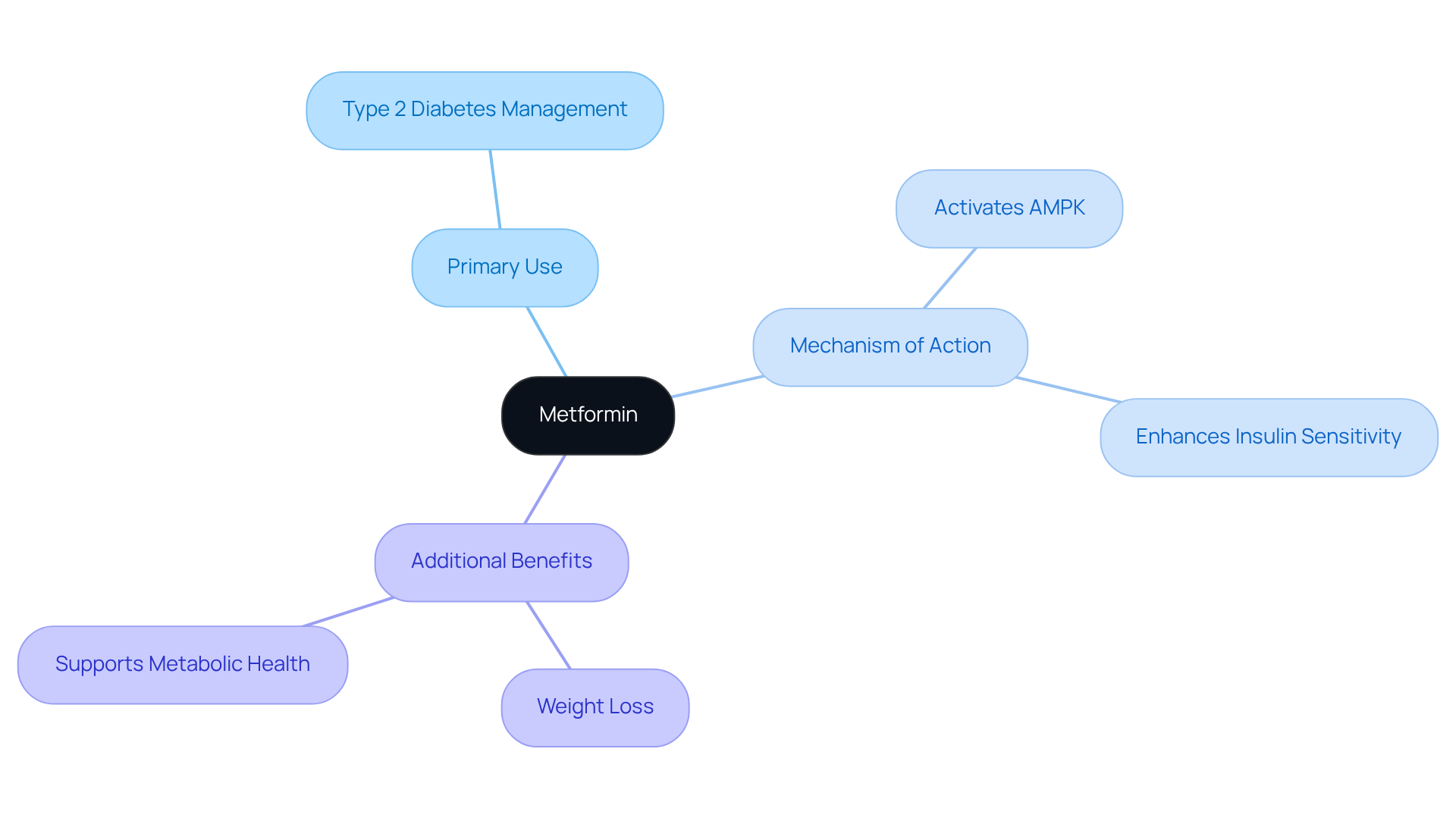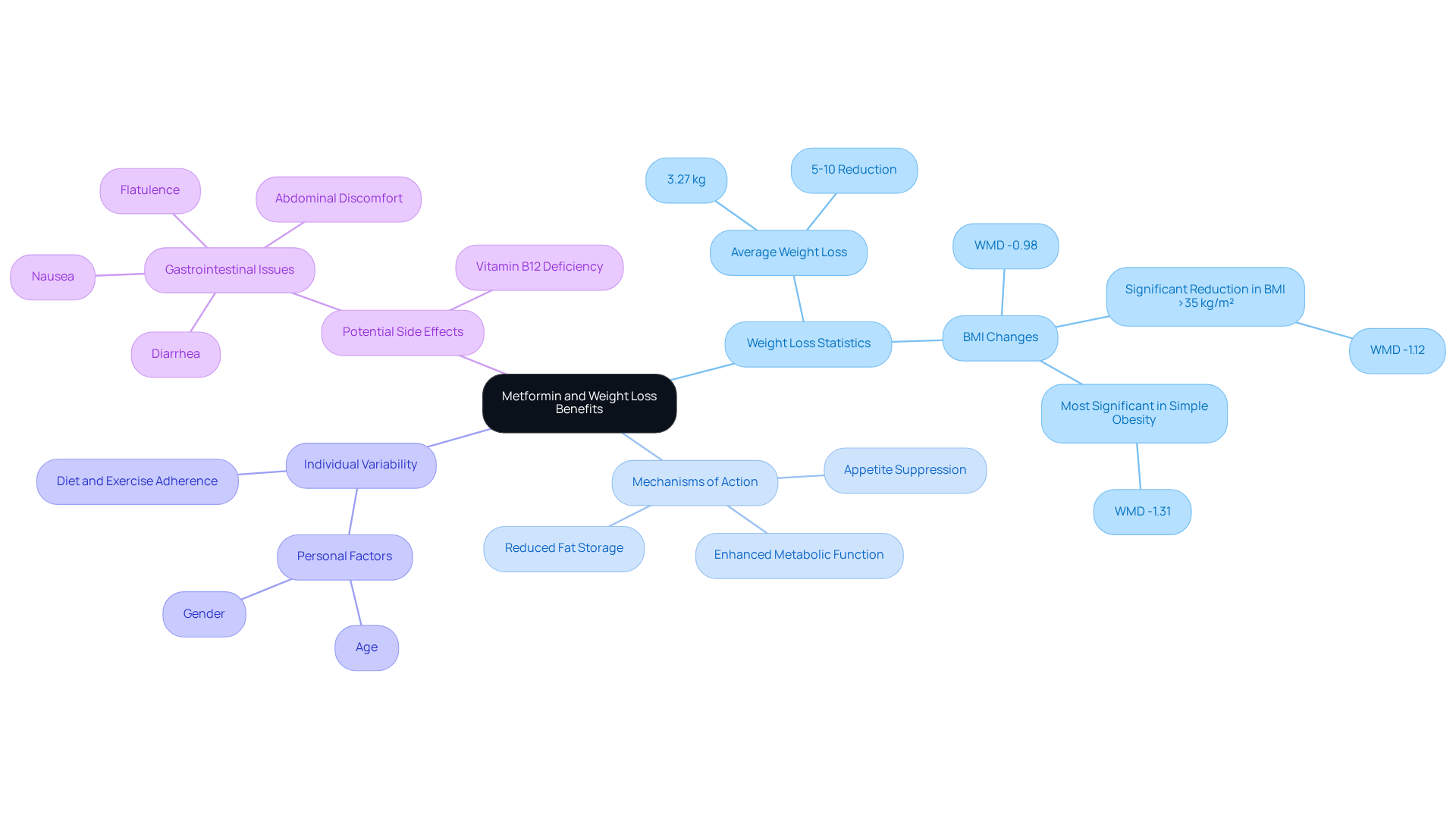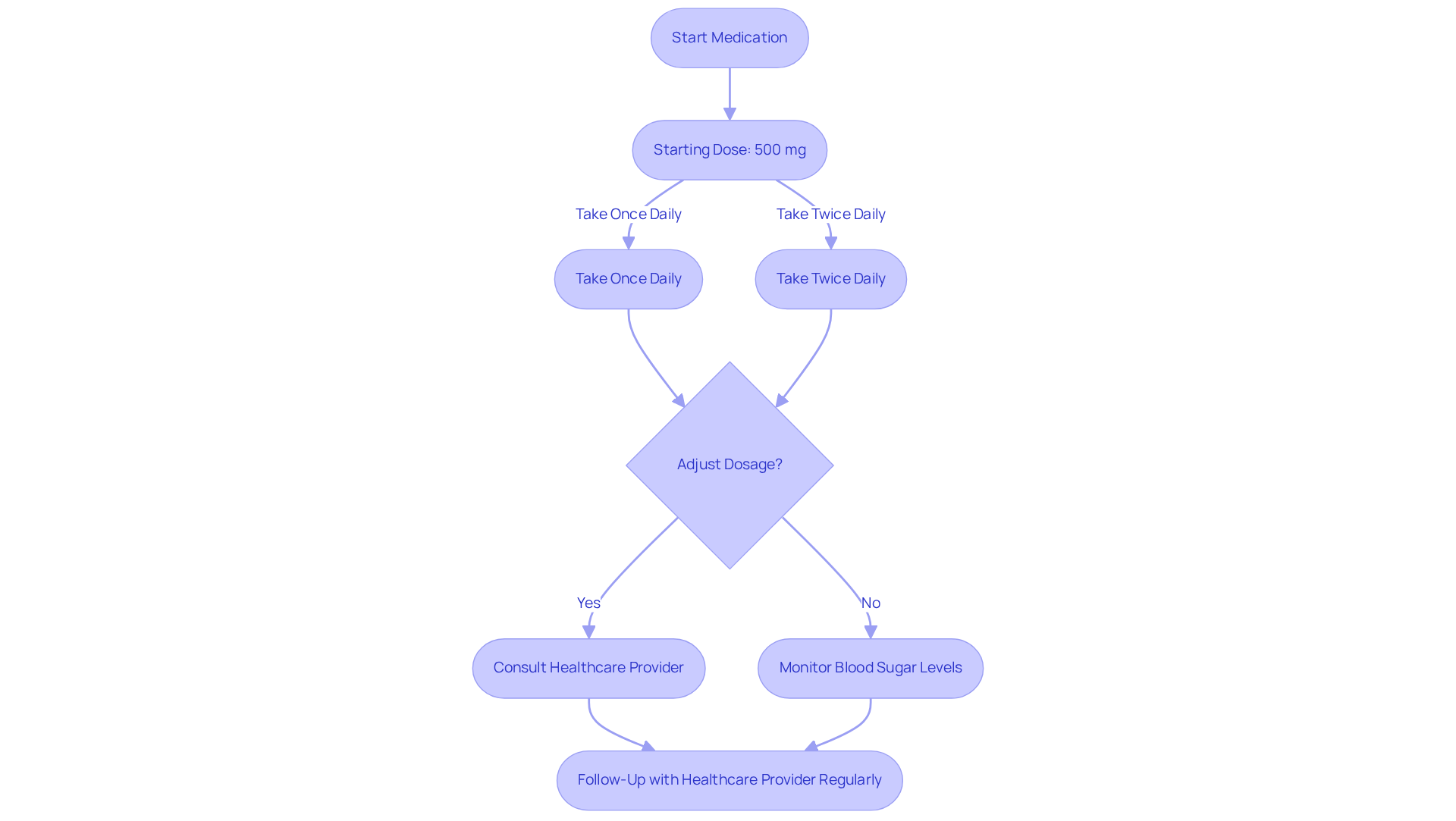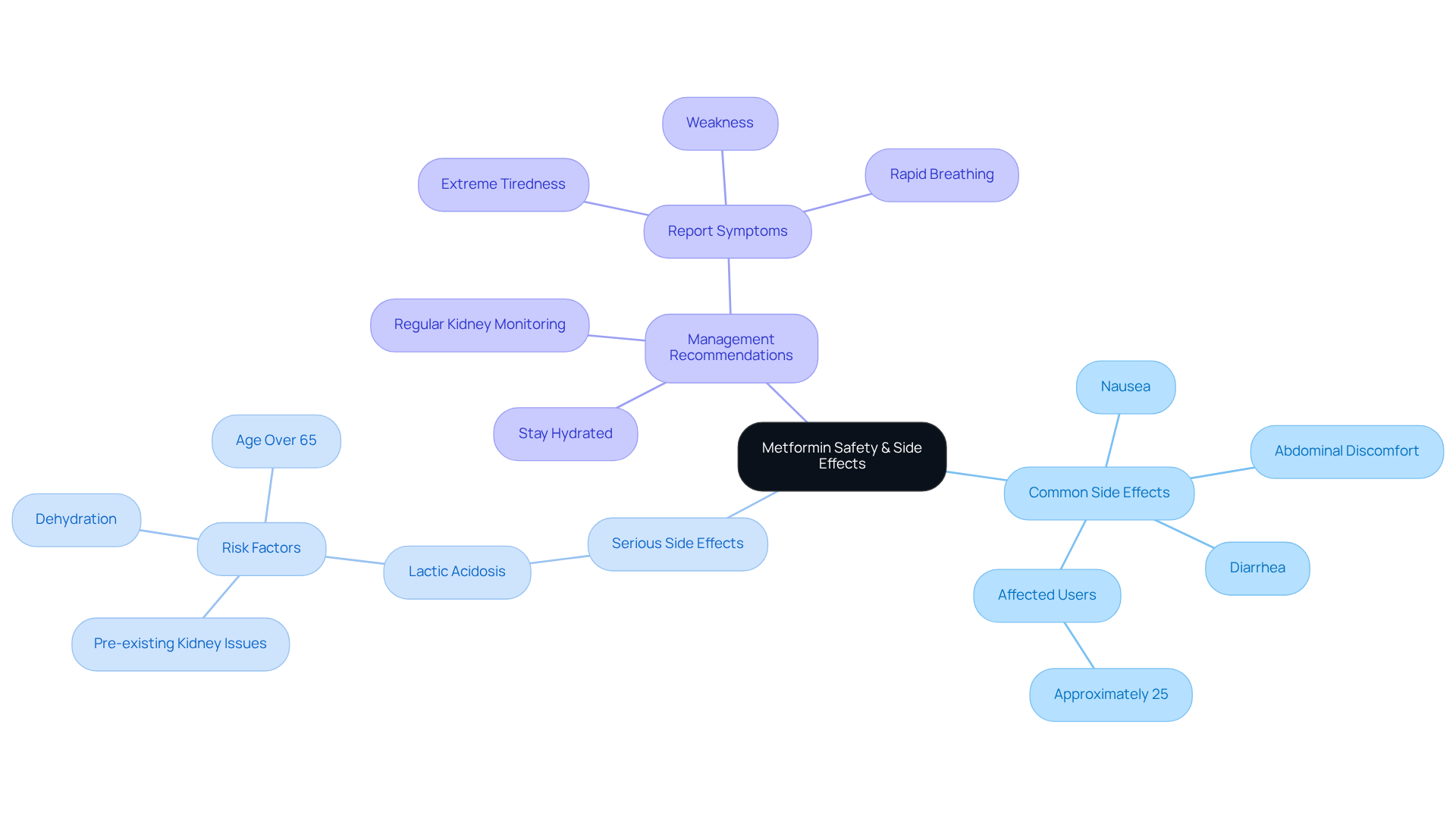Overview
If you’re on a weight loss journey, you may find comfort in knowing that Metformin can help. Research shows that it may lead to an average weight reduction of about 3.27 kg, especially for those dealing with obesity and insulin resistance. This is more than just a number; it represents hope and progress.
Clinical studies support the idea that Metformin aids in weight loss through mechanisms like appetite suppression and improved metabolic function. This makes it a valuable ally in your comprehensive weight management strategy. Remember, it’s not just about the weight; it’s about feeling better and reclaiming your health.
We understand that navigating weight loss can feel overwhelming at times. But with the right tools and support, you can achieve your goals. Together, we can explore how Metformin might fit into your journey and help you take those important steps forward.
Introduction
The quest for effective weight loss solutions can often feel overwhelming, and many individuals find themselves exploring various medications. Among these, Metformin stands out as a noteworthy contender. While primarily recognized for its role in managing type 2 diabetes, this medication has sparked interest for its potential weight loss benefits, especially for those grappling with obesity and insulin resistance.
But how effective is Metformin in aiding weight loss? What factors influence its success? These are important questions to consider, and understanding these dynamics is crucial for anyone contemplating this treatment as part of their health journey. Remember, you’re not alone in this; together, we can navigate these options and find what works best for you.
Understand Metformin: Mechanism and Uses
This medication is primarily prescribed for managing type 2 diabetes, enhancing insulin sensitivity and decreasing hepatic glucose production. By activating AMP-activated protein kinase (AMPK), a crucial enzyme that regulates energy balance and metabolism, it plays a vital role in your health journey.
Beyond its main role, this medication has garnered interest regarding whether do people lose weight on metformin, especially for those facing challenges with insulin resistance or metabolic syndrome. Recent research has shown that do people lose weight on metformin, as individuals using this medication can experience significant decreases in body size.
Understanding how this medication works and following recommended protocols is essential for effective management strategies. Remember, we’re here for you, and together, we can achieve your goals in this journey towards better health.
Explore Weight Loss Benefits of Metformin
Many individuals are on a challenging journey toward weight loss, and studies exploring whether do people lose weight on metformin show that this medication can be a helpful ally. Research indicates that do people lose weight on metformin, as it has been found to aid in achieving slight reductions in body mass, particularly for those grappling with obesity and insulin resistance. Clinical studies suggest that when exploring whether do people lose weight on metformin, patients utilizing Metformin may experience an average decrease in mass of around 5-10% over several months, with a mean reduction of about 3.27 kg observed across various studies. This weight loss, where we often ask do people lose weight on metformin, is linked to mechanisms such as appetite suppression, enhanced metabolic function, and reduced fat storage.
It’s important to note that a meta-analysis involving 1,004 participants revealed a weighted mean difference in body mass index (BMI) of -0.98, with the most significant reductions seen in those with a BMI greater than 35 kg/m² (WMD -1.12). However, individual results can vary based on personal factors like diet, exercise, and adherence to the medication regimen. Have you considered how these factors might play a role in your own experience?
While Metformin can be beneficial, it’s also crucial to consider potential side effects, such as gastrointestinal issues, which are common with this medication. Therefore, we encourage you to incorporate Metformin into a comprehensive weight loss strategy that includes lifestyle modifications. Remember, together, we can achieve your goals, and the holistic health services offered by Minimal can provide the support you need for optimal effectiveness. You’re not alone in this journey, and we’re here for you every step of the way.
Implement Metformin: Dosage and Administration Guidelines
When starting your medication, it’s crucial to follow the recommended dosage provided by your healthcare provider. Typically, the starting dose is 500 mg, which you can take once or twice daily. Adjustments may be made based on how well you tolerate the medication and your blood sugar levels. To help minimize any gastrointestinal side effects, consider taking your medication with meals.
Regular follow-ups with your healthcare provider are essential. These check-ins allow for monitoring your progress and making any necessary dosage adjustments. Remember, it’s important to adhere to the prescribed regimen. If you’re thinking about changing your dosage or treatment plan, please consult your healthcare provider first. Together, we can navigate this journey towards better health.
Assess Safety and Side Effects of Metformin
Managing type 2 diabetes can feel overwhelming, but it’s comforting to know that this medication is widely regarded as a safe option. However, it’s important to be aware that some users may experience side effects. Gastrointestinal issues like nausea, diarrhea, and abdominal discomfort are among the most common complaints, affecting about 25% of users. Fortunately, these symptoms often improve over time, especially when the medication is taken with food or when switching to an extended-release formulation, which has shown significant reductions in gastrointestinal side effects.
Yet, we must also consider the rare but serious side effect associated with this medication: lactic acidosis. This condition can be particularly concerning for individuals with pre-existing kidney issues or those who are dehydrated. Characterized by a dangerous buildup of lactic acid in the bloodstream, lactic acidosis can be life-threatening if not addressed promptly. That’s why regular monitoring of kidney function is essential for patients taking this medication, especially for those over 65 or with a history of kidney disease, as they are at an increased risk.
Staying well-hydrated is crucial, and we encourage patients to report any unusual symptoms—such as extreme tiredness, weakness, or rapid breathing—to their healthcare provider immediately. By understanding these safety considerations and maintaining open communication with healthcare professionals, you can effectively manage your Metformin therapy while minimizing potential risks. Remember, you’re not alone in this journey; together, we can navigate these challenges and work towards your health goals.
Conclusion
Metformin is an invaluable ally in managing type 2 diabetes, and it has also garnered attention for its potential weight loss benefits. This medication not only enhances insulin sensitivity but also plays a crucial role in reducing body mass for those facing obesity and metabolic challenges. Understanding the multifaceted nature of Metformin is essential for anyone considering it as part of their weight loss journey.
Key insights show that Metformin can lead to a modest reduction in body weight, especially among individuals with higher body mass indices. Research indicates an average weight loss of about 5-10% over several months, thanks to mechanisms like appetite suppression and improved metabolic function. However, it’s important to view Metformin as just one piece of a comprehensive weight loss strategy that includes lifestyle changes and regular health monitoring.
Ultimately, the journey toward better health and effective weight management with Metformin is a collaborative effort. By staying informed about dosage guidelines, potential side effects, and the importance of regular consultations with healthcare professionals, you can navigate your treatment effectively. Embracing a holistic approach and fostering open communication with your healthcare team can significantly enhance the effectiveness of Metformin, paving the way for successful health outcomes. Together, we can achieve your goals and support your path to a healthier life.
Frequently Asked Questions
What is the primary use of Metformin?
Metformin is primarily prescribed for managing type 2 diabetes, enhancing insulin sensitivity, and decreasing hepatic glucose production.
How does Metformin work in the body?
Metformin works by activating AMP-activated protein kinase (AMPK), an enzyme that regulates energy balance and metabolism.
Can Metformin aid in weight loss?
Yes, recent research has shown that individuals using Metformin can experience significant decreases in body size, particularly for those facing challenges with insulin resistance or metabolic syndrome.
Why is it important to understand how Metformin works?
Understanding how Metformin works and following recommended protocols is essential for effective management strategies in the journey towards better health.





















